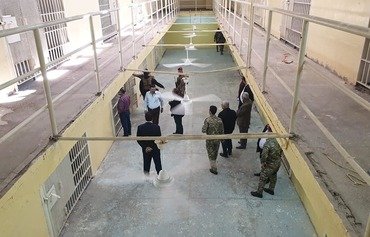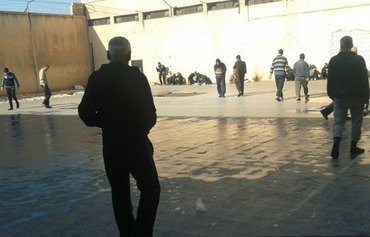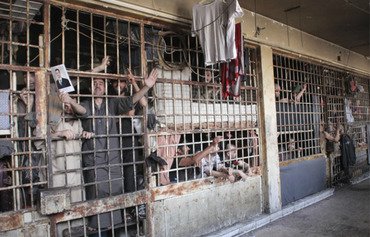Iraqi prisons where "Islamic State of Iraq and Syria" (ISIS) suspects are being held are heavily overcrowded and are in danger of becoming a breeding ground for extremist ideology, experts told Diyaruna.
The government in June decided on a plan to expand prisons, but most prisons and detention centres are beset by poor management and overcrowding of inmates, many of whom are being held on terrorism or criminal charges.
According to some estimates, Iraq is holding "20,000 detainees suspected of association with ISIS", said Iraqi MP Qusay Abbas, who chairs the parliamentary human rights committee.
"We have grave fears of terrorists spreading their extremist thinking inside prisons," he told Diyaruna, cautioning that prisons provide a "fertile soil that helps transform these prisons into incubators that spawn terrorists".
Abbas said the intermingling of suspected ISIS elements with other prisoners in overcrowded spaces is dangerous and could have "troubling consequences".
Inmates who have been indoctrinated with the radical ideology propagated by groups such as ISIS might in turn "take advantage of such environments to promote their ideas and influence other inmates", he said.
"We frequently visit the central prisons and temporary detention centres, and what really shocks us is the large number of inmates and detainees," he said.
Some have been behind bars for several years awaiting trial, he said, noting that "constitutionally and legally, it is unacceptable to detain people without a trial".
In addition to ensuring the judicial process runs in a timely manner, the government must expedite its efforts to build or expand prisons, and to partition prisoners according to their crimes, he said.
A breeding ground for radicalization
The condition of prisons in Iraq is "turning them into fertile ground for radicalization rather than being reform and correction facilities", warned Anas al-Azzawi of Iraq's Independent High Commission for Human Rights.
"We conduct regular visits to the prisons and detention centres throughout the country and have captured in our reports several violations regarding the conditions of detention," he told Diyaruna.
Response from the authorities has been slow and solutions are insufficient, he said, though "we are seeing collaboration from prison administrations to facilitate the work of our monitoring teams, and this is a step forward".
The excessive overcrowding in prisons and the intermingling of the prison population so that "hardened terrorists" are put together in the same cell with those suspected of felonies, is worrying, al-Azzawi said.
The government must quickly implement reforms that start with reducing the number of prisoners in a facility through resolving cases of those in custody awaiting investigations or trials, he added.
New prisons that meet human rights standards must be opened as well, he said.
He also suggested focusing on psychological and behavioural rehabilitation programmes for prisoners as well as religious and cultural awareness initiatives that "highlight the dangers of extremist ideologies".
Ninawa suffers shortage of prisons
There is an acute shortage of detention facilities in Ninawa province, Ninawa provincial council member Ghazwan al-Dawoodi told Diyaruna.
"We currently have three temporary detention centres in Mosul and Tall Kayf that are overcrowded with prisoners and detainees to the extent that halls allocated for reform activities are now filled with detainees," al-Dawoodi said.
"Our reports underscored the importance of resolving the overcrowding issue and improving services provided to inmates," he said, calling on the government to expedite the transfer of inmates who have been sentenced to federal prisons.
There are 2,000 prisoners convicted on terrorism charges, serving a range of sentences, he said, adding that "there is no need for them to remain in detention centres in the province".
These inmates should be able to serve out their sentences in federal prisons located throughout the country, he said.
By remaining in detention centres where they are able to mingle with other inmates who are awaiting trial for lesser crimes, they have the potential to indoctrinate others with their radical ideology, he noted.

![Iraqi officials visit al-Nasiriyah Central Prison on April 1st to inspect conditions inside the prison. [Photo courtesy of Iraq's Independent High Commission for Human Rights]](/cnmi_di/images/2019/07/24/19127-Iraq-Nasiriya-prison-600_384.jpg)







The government, represented by the human rights commission, must take into consideration those young men who were deceived into joining the "Islamic State of Iraq and Syria" (ISIS), who didn’t have their hands stained by the blood of Iraqis, and who committed no crimes. Those can be released under an undertaking and a guarantor so they can return to their normal lives away from intellectual and religious extremism. It should also follow up on investigations with defendants, the progress of such investigations and whether they were conducted under coercion and were made up confessions. It should also follow up on prisons and conditions there.
Reply1 Comment(s)